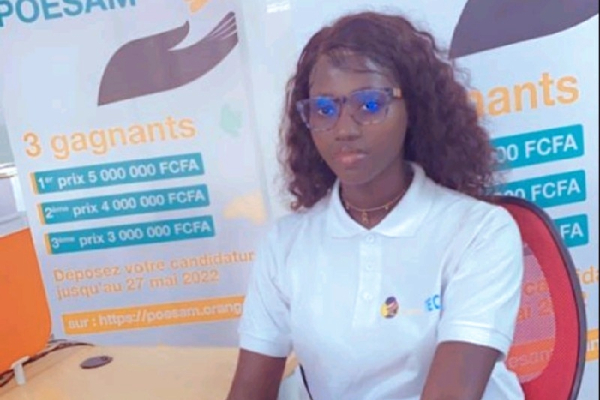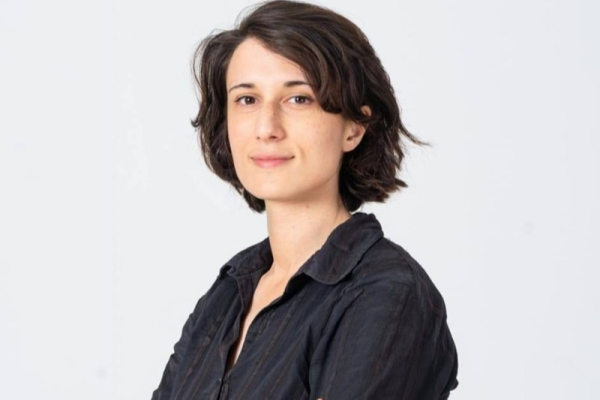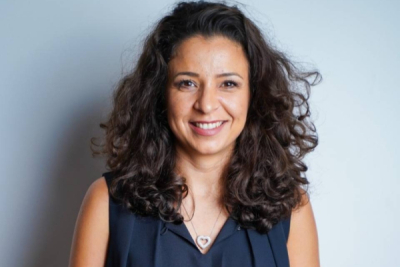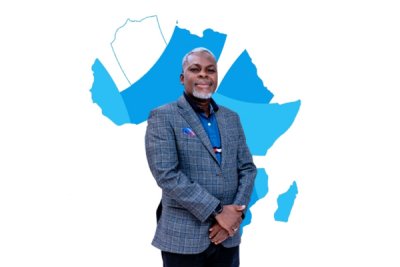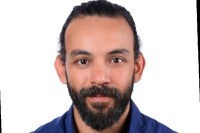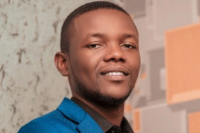
TECH STARS (1006)
With her all-woman company, she wants to inspire and guide more Senegalese women into digital professions. She is also planning several impact projects.
Ndeye Saly Dione (photo) is a Senegalese web and mobile developer. Concerned about women’s digital inclusion, she founded tech startup LingeeruTech in 2022, after graduating from the third cohort of Sonatel Academy, a free coding school.
LingeeruTech is a combination of a Wolof and an English word. It means “tech queens.” Truthful to its name, it works on strong impact projects, mostly with women, to identify daily challenges facing populations and address those challenges.
In an interview with We Are Tech, Ms. Ndeye explained that she launched LingeeruTech to get women involved in the ongoing digital transformation. "It all started with an observation I made [during my training] at Sonatel Academy. In my class, there were not many women. Even when I was a web and mobile development intern at water utility SEN'EAU, I was the only woman on the team. […] In my close circles, I didn’t have a female that could serve as a role model in the digital sector. By setting up that startup, I want to serve as that role model and show young women who are still studying or struggling with professional orientations that women can work in the digital industry,” she explained.
The young entrepreneur indicates that she plans to launch a training center where women and young girls who usually drop out of school early can be introduced to coding and digital tools. The aim, she says, is to give women the skills they need to work with dignity.
Currently, with her team, she is developing two key projects. The first is Fayy Fepp (pay everywhere in Wolof), a fintech solution that aims to help businesses and merchants easily accept mobile payments through QR Coding technology.
The second one is Samamënmën, which means “my skills” in Wolof. It aims to enhance the skills of every Senegalese to enable them to sell their skills and get hired based on those skills, not on the diplomas they have.
Melchior Koba
Thanks to the e-tourism company she cofounded some four years ago, she allows Tunisians and foreigners to take a dip in the past of some Tunisian cultural locations. The XR reality company has earned her several awards and distinctions.
Houda Bakir (pictured) is the CEO of Historiar, a deep tech startup. The startup, founded in 2019, combines artificial intelligence and augmented reality to offer a digitized version of some Tunisian centuries-old historical and archeological sites, allowing tourists and curious individuals to visit them using tech equipment.
During the 46th edition of the Dougga International Festival, held in August 2022, guests were able to gauge Historiar's expertise by going back several years in time to contemplate the archaeological site of Dougga. In February 2023, this expertise earned Houda Bakir a spot in the fifth edition of Orange Fab Tunisia’s acceleration program.
The CEO, born in Carthage, Tunisia, is a graduate of the National Higher Engineering School of Tunis (ENSIT). In 2009, she earned a master’s in electrical engineering and, about seven years later, she obtained a Ph.D. in electrical engineering with a specialization in medical image segmentation. Since 2021, she is the Vice President of Tunisian Startups, a network of entrepreneurs that aims to create a friendly environment for successful and budding entrepreneurs alike. In 2018, she co-founded Super-Viz, a startup specializing in artificial intelligence and computer vision.
A post-doctoral researcher at ENSIT's Productics Research Center laboratory since 2013, Houda Bakir founded Grace Light Tunisia, an interior design and IT service company. She led the company -founded in 2013- until 2014.
The Tunisian entrepreneur started her professional career in 2009, as a contractual assistant professor at ENSIT. Some months later, she became an assistant professor. Then, in 2014, she joined international IT consulting firm Intellixx as a consultant. In 2016, she was hired as a senior research and development engineer at Datavora, a data management company for online commerce companies.
Thanks to Historiar, Houda Bakir took part in several international events, including the Digital Tunisia Days organized on the sidelines of the Expo 2020 in Dubai. In 2021, the company won the Best EdTech Solutions Provider award issued by the digital publication MEA Markets.
As for Ms. Bakir, in 2022, she was named one of the seven North African female tech founders to know by online media Exclusive Africa. Ventures Africa also named her one of the twelve North African female tech founders to know. Still, in 2022, she won the first prize in the Startup Bootcamp organized by Réseau Entreprendre Tunisia and Qatar Fund for Development.
Melchior Koba
She is a business leader with experience in the financial and crypto industries. As the head of Binance in Francophone Africa, she will lead efforts to democratize access to crypto assets and blockchain in the region.
Carine Dikambi (photo) is the regional director for Binance in Francophone Africa. Appointed in June 2021, the executive is "responsible for defining, launching and leading expansion plans, operations and partnerships across Francophone Africa."
"Binance is a digital marketplace (an exchange) where people can buy, sell and exchange cryptos. In addition to being a crypto exchange (the largest in the world by volume), Binance is a blockchain ecosystem and cryptocurrency infrastructure provider with a suite of financial products, and we continue to build key facets of the blockchain ecosystem and contribute to the development of broader industry infrastructure," explained Carine Dikambi in 2022.
Born and raised in France, Carine Dikambi holds a bachelor's degree in banking and finance from the Faculty of Humanities and Social Sciences at Paris Descartes University. She also holds a Master's degree in Management Science from the University of Paris-Sorbonne. A graduate of New York University, where she earned a postgraduate certificate in financial risk management, she started investing in cryptocurrencies in 2016. About four years later, in 2020, she moved to Cameroon to promote digital finance in Africa.
Her professional career began in 2010 when she joined Société Générale Corporate and Investment Banking as an associate. A few months later, she also became a financial analyst.
In 2011, she became Vice President of the Institutional Clients Group at Citi Bank. Then, in 2013, she was named director of risk and information management at fintech company American Express, before being promoted to director in 2016. She held this position until 2021 when she joined Binance.
Since 2018, she has been an IoT and blockchain mentor for Startup Weekend Paris, a 54-hour event that allows different groups to pitch their startup ideas. In 2010, she received the SGCIB Leadership Development Program Class Award. Then, in 2015, she received the Rookie of the Year award at American Express.
Melchior Koba
She is an entrepreneur and digital transformation consultant who has initiated several projects to support the Tunisian tech ecosystem. Betacube, her latest venture, helps entrepreneurs build their startups.
Amel Saidane (photo) is a Tunisian entrepreneur and venture builder. She holds a Master's degree in Electrical Engineering from the Leibniz University of Hannover, Germany (2003) and a Master's degree in Digital Economy from the University of Maryland, USA (2007).
She entered the professional world in 2004 when she joined the IT company Nokia as an Account Manager. In 2008, she joined Microsoft as an Enterprise Account Manager before becoming Managing Director of the consulting agency SlickStone. Between 2016 and 2018, she was the Seedstars Ambassador in Tunisia.
In 2017, she co-founded Tunisian Startups, a network of entrepreneurs that aims to create a friendly environment for successful and budding entrepreneurs alike. She is currently the president of the association. Two years later, she also co-founded Digital2Value (D2V), a platform that aims to accelerate digital transformation by connecting small and medium-sized enterprises (SMEs) to a comprehensive ecosystem of consultants, development organizations, and digital solutions.
D2V has three flagship products. The first is the D2V Digital SME Accelerator, a six-month program that enables SMEs to accelerate their growth by leveraging digital transformation. The second is D2V Market Place, a platform that connects startups. The third product is D2V Studios, a place for entrepreneurial skills development and startup development.
Her most notable startup is Betacube, of which she is a co-founder and CEO. Founded in 2019, Betacube is a venture builder supported by the European Union and Expertise France. It invests, builds, and develops B2B startups in the financial and mobility sectors. Its vision is to create a technology innovation ecosystem where Tunisian and international talent can connect with the world, build successful businesses and drive digital transformation in specific industries. According to Ms. Amel, Betacube supports entrepreneurs from ideation to validation, then to initial funding, and takes stakes in the startups created. In 2022, she revealed that the venture builder has 12 startups in its portfolio.
Amel Saidane is also a member of the advisory board of the United Nations Economic Commission for Africa, a member of the startup selection committee of the Tunisian Ministry of ICT, and a member of the Responsible Leaders Network of the BMW Foundation. She also sits on the board of the Digital Arabia Network. In 2022, she was named on Ventures Africa's list of the twelve North African female tech founders to know.
Melchior Koba
She has over seven years of experience in the e-commerce industry. Her resume boasts experience in several e-commerce companies and financial institutions.
Mame Fatou Ba (photo) is a Senegalese businesswoman with experience in e-commerce and management. The Polytechnic University of Hauts-de-France and the University of Lille graduate is now the general manager of Yoonema, a digital marketplace that gives sellers access to a secure online store, easy payment options, and marketing tools.
Appointed in March 2022, she is expected to contribute her experience to grow the marketplace, which currently boasts more than 1,000 clients. In February 2023, while presenting the marketplace she is now leading, Mame Fatou Ba said: “Yoonema aggregates the different stages of the merchant-buyer journey from first contact to the completion of a transaction and beyond, through continued marketing and customer outreach. We simplify the experience for both the seller and the customer by closing the transaction facilitation gap. Furthermore, Yoonema offers a secured payment platform that builds and reinforces trust in the buyer-seller journey, while mimicking the day-to-day payment landscape known to customers, and also providing payments with major credit cards to suit our already established international customer base.” About a month earlier, the marketplace was selected for the third edition of the Africa Startup Initiative Program (ASIP), which entitles it to $18,000 in equity funding and $750,000 in credit, services, and in-kind benefits.
Mame Fatou Ba joined Yoonema in January 2023 as a senior program manager. Her professional career, however, began in 2011 at B2B service company Asepex, where she was an intern in the textile and handicraft department. In 2012, she also interned at the IT company Soft Solutions as an international marketing assistant.
After an internship in the trade department of Ecobank Senegal and another as a sales assistant at UBA Group in 2013, she was hired by ouiCarry, a freight forwarding company, as a customer service agent. In 2014, she was promoted to director of sales and customer services. After leaving ouiCarry, she freelanced as a consultant and business manager for e-commerce companies before joining Yoonema.
Melchior Koba
He is a business leader experienced in digital payments, channel development, and market segmentation, among others. He will contribute his expertise in those fields to further develop Cellulant.
Ibrahim Gbolahan Aminu (photo) is the new general manager of Cellullant Nigeria. The Obafemi Awolowo University graduate was appointed to this position on February 23, 2023.
Cellulant is a pan-African payment company that provides alternative and locally relevant payment methods for global, regional, and local merchants. The company operates in 18 African countries, with a payment platform that connects thousands of businesses to 154 payment options in 35 countries. The platform handles the payments of some 220 million consumers on a single, inclusive network.
As the new head of Nigerian operations, Ibrahim Gbolahan Aminu will oversee the day-to-day operations and lead the national expansion of Tingg, Cellulant's digital payments platform.
Commenting on his appointment, the general manager said: “I am honored to join the team of innovative thinkers at Cellulant and I am eager to bring my expertise to the table to enhance the payments landscape in the country. I am confident that our efforts in increasing the quality of services and products we offer our customers will lead to greater financial inclusion, accessibility, and stability for all Nigerians.”
His professional career began in 2002 at Adol Pharmaceutical Industries when he was hired as a Senior Sales Officer. In 2006, he joined the Nigerian Gas Company Limited as a budget officer. Two years later, he was appointed Market Segment Manager by Bank PHB Plc. In 2011, he joined Keystone Bank Limited as Product Manager. Then, in 2014, he became head of communications channels and services for Interswitch Group, an integrated digital commerce and payments company focused on Africa. After a month in this role, he was promoted to Head of Partner Channels.
Before his appointment at Cellulant, between 2021 and 2022, he was the general manager of VigiPay, where he managed the company's cross-border payment platform.
Melchior Koba
A physician by training, she served her country for 20 years before launching a healthtech startup that leverages artificial intelligence to detect and treat diseases.
Jaishree Naidoo (photo) is a South African pediatric radiologist and one of the pioneers of pediatric radiology in her country, graduating from the University of Cape Town in 2010. In 1999, she got a bachelor's degree in surgery from the Medical University of South Africa.
After a one-year internship at King Edward 8th Hospital in 1999, she served as Chief Medical Officer at Johannesburg General Hospital in 2000. The following year, she held the same position at Chris Hani Baragwanath Hospital before going back to the Johannesburg General Hospital as a radiology registrar. Four years later, in 2005, she joined the Donald Gordon Medical Center as a part-time radiologist.
In 2008, she was appointed as a Senior Radiology Specialist at the Chris Hani Baragwanath Hospital. From 2009 to 2010, she was a Pediatric Radiology Fellow at the Red Cross War Memorial Hospital before joining the Sandton Medi Clinic as a Radiology Specialist. In 2011, she was appointed head of pediatric radiology at Charlotte Maxeke Hospital, and in 2017, she became head of radiology and chair of the academic committee at Nelson Mandela Children's Hospital.
Aside from her fulfilled professional career, Dr. Jaishree Naidoo is also a tech entrepreneur. In 2019, she co-founded Envisionit Deep AI, a healthtech startup she is leading as the CEO.
The startup uses artificial intelligence to streamline and improve medical imaging diagnosis. It designs various products including the Radify AI platform, which is said to provide fast, accurate, high-quality, and affordable medical imaging diagnostics needed to detect and treat diseases.
“RADIFY for chest x-rays was developed primarily because pneumonia is the number one cause of morbidity and mortality in children under the age of 5 in Africa.
A senseless statistic when it is a disease that is so easy to treat. With RADIFY, diagnostic healthcare can be made available where there is a lack of specialist expertise,” Dr. Naidoo explained in 2021.
The CEO is also a notable conference speaker. She has been invited to speak and chair sessions at many local and international radiology and healthcare conferences, such as the 2020 Forbes Women Africa event, where she was one of the speakers.
According to Forbes, Dr. Naidoo is one of “UK-Africa’s Top 15 African Female Tech Founders and as such was honored by MPs at the UK Houses of Parliament in January 2020 in London.”
In 2020, her startup, Envisionit Deep AI, won two categories (Healthtech and social impact) at Apps Africa Innovation Awards. It was also one of the Season 2022 Regional Winners of the African Startup Awards. On February 23, 2023, it raised $1.65 million to continue its development in South Africa and beyond.
Melchior Koba
He is an experienced engineer in the energy industry and a fintech entrepreneur. He is also the founder of Copal, a fintech startup that allows families to track and manage their expenses.
Ahmed Refaat (photo) is an Egyptian entrepreneur who graduated from Cairo University with a Bachelor's degree in Mechanical Engineering and from Said Business School at Oxford University with a Master's degree in Business Administration. He is also the CEO and a co-founder of fintech startup Copal.
The startup, founded in 2021, develops solutions to improve expense management. Using its eponymous AI-based app and personalized prepaid cards, its users can buy, pay, transfer, withdraw and save money with just one click. On February 15, the startup, which recently graduated from the Flat6Labs accelerator program in Cairo, entered into a strategic partnership with Mastercard to launch Egypt's first family payment and expense management app.
The new solution allows parents and guardians to track and manage their young dependents’ finances. It comes with simplified financial education tools that promote youth inclusion in the digitized payment ecosystem and help them become financially savvy.
“Copal’s vision is to fill the gap for the un- and under-banked through introducing a product that is tailored specifically for their every need. […]We are proud to partner with Mastercard, and we are confident that, with their leadership and support, Copal will grow and expand as fast as we ambitiously planned,” said Ahmed Refaat.
Before Copal, in 2016, the CEO had co-founded Odqa Renewable Energy Technologies, an “engineering spin-out from Oxford Thermofluids Institute.” He served as the company's chief technical officer until 2021 and as chief operating officer between 2020 and 2021.
His professional career began in 2007 with Schlumberger, a technology company unlocking energy access for the benefit of all. He joined the company as a field engineer before being promoted to general field engineer in 2013. In 2014 he was named technical and sales support engineer and in 2015, he became the company's wireline account manager.
Melchior Koba
After five years managing projects for telecom operator MTN, he teamed up with another entrepreneur to launch Djamo, which aims to fill the gaps left by traditional financial institutions.
Régis Bamba (photo) is an Ivorian computer scientist and tech entrepreneur. A graduate of Towson University (USA), where he earned a bachelor's degree in computer science in 2011, he is the chief product officer and one of the co-founders of fintech startup Djamo.
Founded in 2021, Djamo helps people improve their money management. Through its eponymous app, it enables underbanked individuals to manage their daily expenses and plan for their future with savings and investment plans. In short, it helps them regain control of their finances.
The startup also issues VISA cards to its users and does not charge any fees or commissions. It is the first Ivorian startup to join the prestigious US incubator Y Combinator.
Explaining the startup's no-fee, no-commission policy, Régis Bamba states, "In our region, users pay amongst the highest fees in the world but do not always receive adequate service in return and that can be extremely frustrating. The one thing that we want to achieve is to offer a product where customers get real value for their money."
In November 2022, the startup announced that it had raised $14 million from Y Combinator and three other lead investors (Enza Capital, Oikocredit, and Partech Africa), with Janngo Capital, P1 Ventures, Axian, and Launch Africa as participating investors.
Before launching the startup, Régis Bamba worked for the telecom operator MTN as a mobile money project manager (2014-2016) and product manager (2016-2020). In 2014, he founded Code.ci, a network of developers who pool their expertise to address socio-economic challenges in Côte d'Ivoire. This network, together with the government, is the originator of the first open data platform in Côte d'Ivoire.
Melchior Koba
Fidèle Nsadi (photo) is a Congolese computer scientist and technology entrepreneur who graduated from the University of Kinshasa in 2022. He is the co-founder and CEO of tech company Faithful LLC.
Through Faithful LLC, he launched a fintech solution that works without an internet connection. The solution, called Express App, offers quick and easy access to financial services, including mobile money, mobile banking, and plan activation services, among others. Thanks to its USSD-based technology, the app makes life easy for its users and provides a very intuitive user experience.
"Express App is a mobile fintech solution that aims to accelerate financial inclusion by offering several financial services in the DRC and the rest of Africa in a simple and fast way. The peculiarity of Express App is that it works without an Internet connection, to allow a large number of people to access financial services such as mobile money, mobile banking, and the purchase of credit via a mobile application, even if they do not have access to the Internet, the penetration rate of which is still very low in the DRC and in many other African countries," Fidèle said in an interview published by TechCabal in February 2023.
Express App is not the only product launched by Faithful LLC. The startup, which was incubated by DR Congo incubator Ingenious City (October 2020-March 2021), also launched an instant messaging platform called Masolo.
For this messaging platform, Fidele Nsadi was the front-end developer. His entry into the professional world happened in 2018 when he worked as an IT manager for Convipat, an association that promotes agriculture and the consumption of healthy local products.
In 2019, at the university in Kinshasa, he was chosen as an assistant project manager for a project aimed at building a water supply system for residents in Dwale in the Bateke plateaus. In 2020, the fish production center RATALBI Pisciculture hired him as an IT consultant.
Melchior Koba
More...
He is an experienced software engineer and an important player in Gabon's digital ecosystem. He is appointed director general of the National Agency of Digital Infrastructures and Frequencies (ANINF) after more than 27 years of working in various public institutions in the country.
Aimé-Martial Massamba (photo) is a Gabonese computer engineer who graduated from the Casablanca Higher Institute of Applied Engineering. He also holds a Master's in multimedia communication and information technology from the University of Picardie Jules Verne (UPJV).
On Monday, February 20, 2023, he was appointed Director General of Gabon's National Agency for Digital Infrastructure and Frequencies (ANINF) during the ministerial council held that day. As the new director general, he will lead the activities of the agency, whose mission is to develop digital infrastructure in Gabon and to develop effective e-Government applications.
His appointment is the result of all of his achievements within the ANINF, which he joined as a project manager in 2011. As the project manager, he oversaw the implementation of several major state projects including the national geomatic plan and the registers of natural and legal persons. In 2014, he was promoted to head the key infrastructure management department within the ANINF.
His professional career started in 1995 at the Directorate General of Taxation, where he was the deputy project manager. In 1999, he was appointed deputy project manager in charge of the development of the front office applications used by the national identity card establishment center.
In 2001, he was appointed as a research officer at the DGBS, the agency in charge of the management of academic scholarships. He notably designed and developed the client-server graphical application used to manage government scholarships, dematerialized the scholarship application process, and developed a website where various commissions post application results.
Melchior Koba
He studied in France and the United States and gained experience working for several companies and management firms before joining Jumia some eight years ago.
Francis Dufay (photo) is an Ivorian entrepreneur and a Management and marketing graduate from the Global Alliance in Management Education (CEMS) and Northwestern University's Kellogg School of Management. He was recently appointed CEO of the e-commerce group Jumia.
He formally became CEO of the unicorn in February 2023 but, he had been acting in the position since November 2022 when the e-commerce group's co-founders stepped down as co-CEOs. In that position, his role is to oversee Jumia's pan-African expansion into 11 countries, as well as the evolution of its products, which now include a marketplace, its payment arm JumiaPay, and a logistics platform, Jumia Logistics.
Jumia is a technology company built to help consumers conveniently access millions of goods and services while giving sellers a new avenue to reach more clients and grow their businesses. The company already has over 1 billion visits, 100,000 active sellers, 50 million products, and over 8 million active consumers in Africa.
Confident in the e-commerce group's potential, Francis Dufay says "we remain more than ever confident about the growth opportunity across our markets and are making fundamental improvements to our consumer value proposition which will help us drive sustainable long-term growth."
The new CEO joined Jumia as the managing director of Jumia Côte d'Ivoire. From March to November 2022, he was the executive vice president of Jumia in charge of African operations. Then, from November 2022 to February 2023, he was the Acting CEO of Jumia Group. He joined the professional world in 2009 when he was hired by McKinsey & Company as a business analyst. In 2012, he was appointed associate junior engagement manager for the same consulting firm.
In 2007, he interned as an analyst at Business France, the "national agency supporting the international development of the French economy." He completed another internship at Deloitte & Touche from September 2007 to February 2008.
Melchior Koba
A doctor by training, he wanted to address the poor access to healthcare services in his country. So, along with his friends, he launched an app that allows remote consultations.
Desire Ruhinda (photo) is a Tanzanian medical doctor who graduated from Kilimanjaro Christian Medical University with a Ph.D. in 2019. In 2021, he also graduated from the University of Cape Town's Graduate School of Business with a Master of Philosophy in Inclusive Innovation. A year earlier, he co-founded the healthtech startup Medikea, with his friends Elvis Silayo, and John Manko.
In 2016 he joined the International Federation of Medical Students Association as the national exchange officer. In 2019, he became a medical trainee at the Muhimbili University of Health and Allied Sciences.
Currently, he is the logistics manager of the non-government organization International Federation of Medical Students Associations (IFMSA).
He is also the CEO of the healthtech startup Medikea. Through the startup, he offers online consultations with doctors and supplements them with lab tests and home drug delivery, so patients can get timely care, avoid long queues and save money.
The doctors registered on the platform can manage common and chronic illnesses, mental health, and lifestyle issues. The solution is suited for anyone seeking high-quality, affordable, and convenient treatment for non-emergency medical problems, medical advice, a prescription, a letter of recommendation, a medical certificate, or a second opinion on a pre-existing condition.
Recently, in February, it was selected by Kenyan venture capital company The Baobab Network as one of the five startups that will participate in the 2023 Baobab Network's acceleration program. The selection entitles it to $50,000 support.
Melchior Koba
The successful entrepreneur worked for Facebook's parent company Meta before starting his own company, which has quickly become one of Africa's unicorns.
Ham Serunjogi (photo) is a Ugandan economist and entrepreneur. He is the CEO and one of the co-founders of the fintech company Chipper Cash.
Founded in 2018 and based in San Francisco, Chipper Cash develops software for instant cross-border payments in Africa and Europe. It also develops solutions to help businesses and merchants process online and in-store payments.
It is "a lifestyle payment platform that started as a cross-border product. It is now a more holistic platform for people to not just send and receive money easily, but also do things like investing," Ham said in 2021.
The startup, which is available in seven countries, has more than 5 million users and more than 300,000 Visa cards issued.
Its CEO is, since May 2022, a member of the Grinnell College Board of Trustees. He entered the job market with internships at companies such as the cleantech accelerator Cleantech Open (2013), the edtech company Fullbridge (2014), and Meta (formerly Facebook) in 2015.
In 2016, he joined Facebook (now Meta) as a Client Manager responsible for building partner relationships with some of the largest advertisers in the UK.
Thanks to Chipper Cash, he made it to the international non-profit journalism organization Rest of World's 2022 list of the 100 Global Technology Change Makers of 2022.
A former competitive swimmer, Ham Serunjogi competed for several years and represented Uganda at the 2010 Youth Olympic Games in Singapore. He was also named the 2010-2011 Athlete of the Year by the Aga Khan Academy in Mombasa.
Melchior Koba


